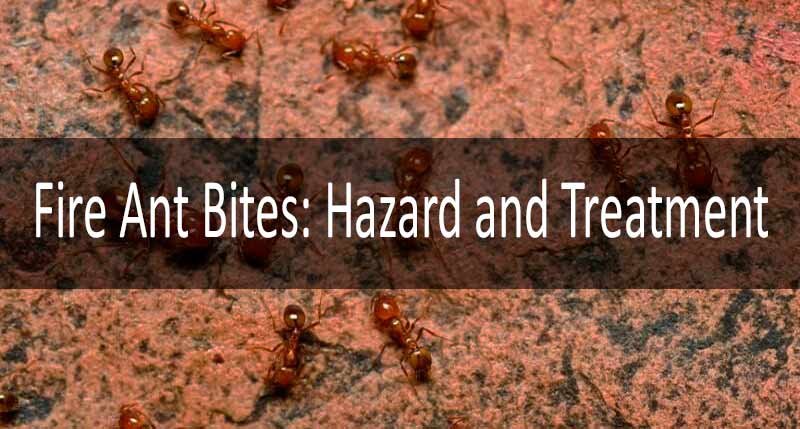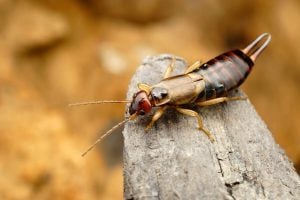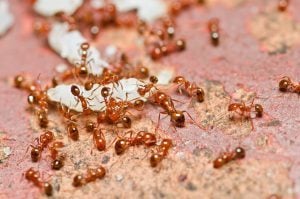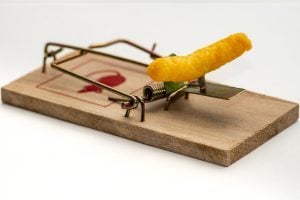Have you ever experienced a fire ant bite? If yes, then you must be aware of how irritating and painful it can be. As a matter of fact, the rate of fire ant bites incidents is increasing, especially in southern regions. You should, therefore, know some facts about ants:
- According to the Schmidt pain sting index, their sting is equal to being exposed to an open flame.
- Apart from powerful jaws, these creatures have got a poisonous sting. When attacking, they rip your flesh and inject poison there. Unlike bees, ants can sting multiple times and survive afterwards. They sting every 10-15 seconds! Also, the entomologists from the University of Texas at Austin claim that at the moment of biting fire ants release the special alarm pheromone (chemical signal) that excites additional fire ants to attack. Both native and imported fire ants are small, dark orange/brown ants with workers of various sizes that quickly mobilize and sting en mass when their mound is disturbed .
- Fire ants are practically invisible. Attention is the simplest way of protecting yourself against fire ants bites. They are tiny and are hard to notice. When walking out in the wild, or settling for a picnic, look around. You can be seriously harmed if you don’t notice the ants in time.
- Fire ant mounds are usually not mounds at all. The mounds of loose soil, resembling gopher diggings, are found above ground. Be careful they are very protective of their mounds. Worker ants move the brood up high when it is wet. That’s why you see tall mounds after rains. When conditions are dry, they move the brood deeper to more humid chambers and you may see no mounds at all. Mounds can extend as much as four feet below the surface.
Why Fire Ant Bites are Dangerous? Need more info on…. How to get rid of fire ants.
Anyone who has ever been bitten by fire ants knows the answer to this question. That person will say that the bite hurts very much and it seems that they crawl up your feet onto your legs and bite all at once. But the pain is not the only danger borne by these ants for humans and pets.
“2 in 1” type of sting.
Fire ant poison is a real chemical compound. It contains the chemicals which destroy skin cells (hence the white fluid-filled pseudo-pustule, redness, and itching). According to the scientists from the University of Florida, “Approximately 95% of the venom is composed of these alkaloids, which are responsible for both the pain and white pustule that appears approximately one day after the sting occurs. The remainder of the venom contains an aqueous solution of proteins, peptides, and other small molecules that produce the allergic reaction in hypersensitive individuals”. Humans may experience not only the stinging sensation, but they can get huge red swells and even white ulcers. Later they turn into scars which don’t heal for several weeks.
 Allergy and other toxic reactions.
Allergy and other toxic reactions.
Fire ant poison is especially dangerous for those with allergies (it’s about 1% of the population). It contains a strong mix of allergens and is not inferior in this respect to the bees’ and wasps’ poison. In the “best case scenario” a patient will suffer from dizziness, nausea, excessive sweating, and itching.The worsening of preexisting cardiopulmonary disease, serum sickness, seizures, mononeuritis, nephrotic syndrome also may be associated with fire ant bites. The worst scenario is angioedema, a condition that is often lethal. An instant anaphylactic shock also occurs frequently. In general, you won’t do without the help of special medicine and experienced doctors.
They hurt pets.
These ants are aggressive. And often they get on pets and livestock and bite them vigorously. Since dogs, cows and horses cannot shake or swat them off their body, these ants can cause serious injuries and distress.
They spoil food.
Fire ants can get into the kitchen or to the vegetable garden bed. According to the scientists from the University of Florida, the diet of foraging workers consists of dead animals, including insects, earthworms, and vertebrates. Workers also collect honeydew and will forage for sweets, proteins, and fats in homes. They are sometimes attracted to piles of dirty laundry. Larvae are fed only a liquid diet until they reach the third instar. When the larvae reach the fourth instar, they are able to digest solid foods. Worker ants will bring solid food rich in protein and deposit it in a depression in front of the mouth of the larvae. The larvae will secrete digestive enzymes that break down the solid food and regurgitate it back to worker ants. The queen is fed some of the digested protein to support egg production. As long as food is plentiful, egg production is at its maximum. Yay! More ants!
Preliminary Measures
- Fire Ant Bite Allergy Check. The first thing you need to do is to check whether or not you are allergic to fire ant bite. If you are, you may experience tightness in chest, nausea or diarrhea as a result of fire ant bites allergic reaction. The experts from the University of North Carolina Wilmington Abrons Student Health Center recommend to seek attention if you develop: “whole-body rash and itching, difficulty breathing (wheezing, noise on breathing in), or become shocky (pale, sweaty, faint, lightheaded, confused, etc.)”. Under such circumstances, you shouldn’t treat these bites on your own and should immediately contact a medical practitioner for detailed examination and treatment. However, if you aren’t allergic to these bites, then you may treat the problem on your own since the situation won’t be that critical.
- For mild reactions: Rest and elevate the affected body parts. Elevation helps minimize swelling and discomfort. Take over-the-counter antihistamines. Hydrocortisone cream, also available over-the-counter, can help decrease inflammation and itching of the bites. If you have significant swelling, apply cold packs to the area off-and-on for the initial 24 hours. Cold helps reduce discomfort and swelling.
- Get Away From Infested Sites & Remove the Ants. In most cases, fire ants will bite you when you accidentally touch their mound either by standing or by sitting on it. The first thing you need to do is to get away from the site and remove the ants from your skin. If possible, take off your shirt to clear your body of all the fire ants that might have crawled up through your sleeves.

How to Treat Fire Ant Bites
Suppose they have bitten you. What should your reaction be?
FYI: Don’t hit fire ants; it will only make them angry. Brush them carefully with your hands and off your body to the ground. They bite every 5-10 seconds, so hurry up!
Never Pop the Blister! Just within a few hours, a blister will appear on the affected part of the skin with a dreggy fluid inside it. Never pop it with your nails. And if it somehow pops by itself, immediately remove the fluid from your skin. You can clean it with some rubbing alcohol and apply a triple antibiotic ointment.
So, you need to perform some important steps:
1. Wash the Affected Part of the Skin
Wash the affected part of the skin with soap and water or with rubbing alcohol. It not only helps remove all kind of dirt particles from the skin which could have caused further infection but also soothes fire ant bites by neutralizing the acidic sting. This helps controlling swelling as well.

2. Control the Swelling and the Itching
The first thing you would do is control fire ant bites swelling by raising the attacked body part above your chest level. For example, if it bites you on your hand or wrist, try raising it so that the blood flow to this part of the body is minimized and the swelling process is slowed down.
Don’t scratch bites! If microbes get into wounds, this can result in secondary infection.Itching can be immediately controlled by putting an ice pack over the infected area. This helps to control that intense itching and pain. If itching is awful, use such products as StingEze Dauber for a – this low-cost remedy is recommended by scientists because it helps to eliminate pain & itching and reduces infection. Or you may apply Benadryl Itch Relief Spray : it’s a multipurpose remed.
OR You may also try traditional methods. A mixture of baking soda and water may also work.

3. Take Antihistamine if you Need
Antihistamine pills (such as benadryl) help to fight allergic reactions and are an excellent fire ant bites remedy. Take these drugs (as recommended by the doctor) before it swells too much. This will help control the itching, pain, and swelling at early stages. Be careful as antihistamine drugs can make you sleepy, make sure you are not needing to drive.
You may spray insect repellent containing DEET onto your shoes and lower pants leg. This may help deter foraging fire ants from climbing onto the legs, it’s a good advice from scientists.
Read our review of the best outdoor and indoor fire ant killers – “7 Best Fire Ants Killers: a Review of Traps, Gels and Insecticides”.
{code 416}






3 thoughts on “Fire Ant Bites: Hazard and Treatment”
I read this article and wanted to vote, so I started clicking on the stars from left to right and it counted the first click as my vote. I should have clicked on the 5th star, indicating that I thought the article was excellent, but it wouldn’t let me vote again. So the one vote you see should be 5 *****, not 1 *. Sorry. Great article.
Wasn’t very helpful about bites that just won’t heal. Already went through the initial bite.
Can you prevent the white pustules from forming?